Doctor’s AIDS Suit Blames Hospital : Health: ‘Extern’ says negligence caused her infection. Medical experts and gay activists see the trial as a test case.
- Share via
NEW YORK — At a trial being closely watched by the nation’s medical community and gay activists, the attorney for a doctor suffering from AIDS claimed in opening arguments Monday that the “young and brilliant physician” is suffering a “slow and tortuous death” because of the negligence of hospital officials and supervisors.
Diane Wilner, an attorney representing Dr. Veronica Prego, said that the 32-year-old, Argentine-born physician contracted the deadly disease after pricking herself with an infected hypodermic needle carelessly left in a hospital bed by a co-worker.
Wilner charged that Kings County Hospital, a municipal medical facility in Brooklyn, N.Y., where Prego was working as an unpaid “extern” at the time of the alleged needle stick in 1983, failed to train hospital staff properly in the disposal of contaminated equipment and did not provide any needle disposal boxes near the beds of AIDS patients.
“There cannot be a happy ending,” Wilner said of her client. “This nightmare will only end with her death.” Prego is seeking $175 million in damages.
Stanley Friedman, an attorney for the city’s Health and Hospitals Corp., which operates all the municipal hospitals in New York’s five boroughs, attacked Prego’s credibility and contended that her own negligence may be at the root of her tragic case.
The case has drawn widespread attention because of its potential for influencing the way hospital staffs treat AIDS cases. Gay-rights groups in particular are concerned that the suit, if successful, could discourage hospitals from taking on AIDS cases.
In her suit, Prego charges that Dr. Joyce Fogel, who was an intern at Kings County Hospital at the time of the alleged needle stick, left the contaminated instrument in a bundle of “wrappers and gauze” on the bed of an AIDS patient after drawing a blood culture.
Prego was required to dispose of the refuse, but she was not advised of the number of needles used in the blood test and inadvertently pricked herself, according to court documents.
In his arguments during the state Supreme Court trial in Brooklyn, however, Friedman claimed that when Prego first initiated the legal action against the city, she had only a vague recollection of the alleged incident. “She didn’t know the year,” he said, “she didn’t know the month.”
On various occasions before the trial, Friedman added, Prego also has misnamed the AIDS patient upon whom she alleges Fogel performed the blood test and has admitted that “she didn’t know what went on during the time she alleges Dr. Fogel was present.”
Fogel, who also is a defendant in the case along with the Health and Hospitals Corp., Kings County Hospital and another physician, has denied drawing blood on the patient that evening.
Friedman also contended in his opening statement that, contrary to allegations in her suit, Prego was not “requested to pick up anything by anybody.” But in any event, he said, she should have exercised more caution since she was familiar with the possibility of infection from a needle-stick injury, a common occupational hazard for health-care workers.
“We all have compassion and we all have sympathy for this individual,” Friedman said. But, he concluded, “She’s claiming she’s not at fault. We believe at all times she had exclusive control over dangerous instrumentalities.”
Wilner, Prego’s attorney, said that when Prego reported the alleged incident at Kings County Hospital, she was told not to worry because there were no reported incidents of workers becoming infected with the AIDS virus by a needle prick.
Prego was present during opening arguments, appearing worn and frail but calm and composed. The trial is being heard by a jury of three men and three women.
According to the federal Centers for Disease Control, there have been 19 reported and documented cases involving health-care workers who have been infected with the virus causing AIDS through job-related exposure.
“We know there are probably many more, but we don’t know how many more,” a CDC official said. “We have others under investigation.”
Dr. Robert T. Schooley, an AIDS specialist at Massachusetts General Hospital and Harvard University who has studied the rate of infection among health-care workers who suffer needle-stick injuries, said that the current risk of infection from such an accident is about 1 in 250.
That compares to a risk of 1 in 4 of infection with hepatitis B from a similar needle prick.
Schooley said that the “whole issue of becoming infected with HIV (human immunodeficiency virus, which causes AIDS) is already making it harder and harder to recruit physicians, not just to take care of AIDS patients but to go into medicine at all.”
Robert Bray, a spokesman for the National Gay and Lesbian Task Force, said, “If we create an alarmist environment of medical practitioners afraid they’re going to become infected, the repercussions could be discrimination against people with HIV.”
More to Read
Sign up for Essential California
The most important California stories and recommendations in your inbox every morning.
You may occasionally receive promotional content from the Los Angeles Times.










